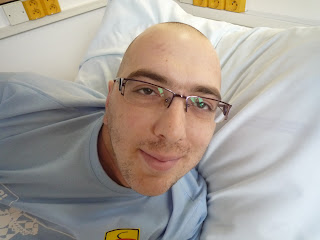Never have really heard of it, even when I was working in the oncology unit…
But when the lump appeared, I did some reading and one of the possibilities were Testicular Cancer (TC).
Here would be my concise information about TC with relevant links below for more info.
Click here to find out how cancer develops - simple & good animation :)
1.
It is a really rare form of cancer - constitutes only 1 - 1.5% of all
cancers in men. Which also means the chances of getting TC is like 1 in
every 100,000 males. On the other hand, it has doubled in the past 30
over years.
Oh and you only need to be a little more concern if:-
- You're white (Asians:rare and Blacks: rarer)
- 15 - 44 years old are the usual targets
- Over 6ft tall
- Had prior problems with your testicles
- History of cancer in the family line
2.
Good news! Very high cure rate no matter the extent of it, in
particular to seminoma. 95% cure rate, some say it's even higher.
3. Can be categorized into 2 types: non - seminoma & seminoma
4. Seminoma is better than non-seminoma (Pavel had non-seminoma) as non-seminoma tends to be more aggresive
5. Testicular examination should be done monthly -
HOW?
Diagnosis:
Biopsy is rarely done in this case, as the risk of spreading is quite high.
Ultrasound
will be done to determine whether it is a tumor or infection, chest
X-rays, CT scans will be done as well to ensure that no spread has taken
place.
Blood test will be done to look up the tumor markers.
Note:
Usually a lump in the testicles would dictate an infection (will
usually come with the usual signs, like fever & constant pain)
Treatment:
Orchiectomy (or-ki-te-me),
RPLND, Radiotherapy, Chemotherapy & Surveillance
For ochiectomy and RPLND please click on the link for more info.
Radiotherapy is mostly for seminoma and Stage I cases.
Chemotherapy is usually used for non-seminoma cases.
Surveillance is used when the risk of relapse is low, usually in Stage I cases.
Now in Europe, the option of RPLND is rare due to the fact that
there are few expert surgeons on it. Thus the risk of complications are
high.
And in Europe, oncologist are rather conservative and would
mostly give adjuvant chemotherapy even in Stage 1 cases (which are
considered low risk by a few experts, refer to links). Oncologist here
in Czech Republic follows the European Cancer guidelines which states
that for any non-seminoma Stage 1 cases, adjuvant chemotherapy is given.
This
is due to the fact that, they believe that the risk of relapse is high
and especially since the tumor markers before the op was high.
Although
I have consulted with a prof based in UK's Cancer Research Institute,
which specializes in TC: any Stage 1 is considered as low risk and
surveillance is an acceptable option.
So there are 2 schools of thought, surveillance or adjuvant
chemotherapy for Stage 1 case. Bearing in mind, that generally 70% of
Stage 1 non-seminoma and 80% of Stage of seminoma is cured by the op
alone.
Adjuvant chemotherapy: BEP regimen - very good prognosis = high cure rate :)
NOTE: BEP regimen article to be written soon
If chemo were to be given than sperm banking would be highly useful - you never know.
Wait for post on Sperm Banking ;)
Surveillance:
copied from link
- Year 1: Tumor Markers and Chest X-ray done every month
Abdominal CT scan done every 2 months
- Year 2: Tumor Markers and Chest X-ray done every 2 months
Abdominal CT scan done every 4 months
- Years 3-5: Tumor Markers and Chest X-ray done every 6 months
Abdominal CT scan done every 6 months
- After Year 5: Tumor Markers and Chest X-ray done once a year
Up to date, there's still no particular cause of why TC occurs, a
part from having particular problems/issues with the testicles. TC cases
are on the rise, and it would be imperative to find out the causes of
it.
One thing is definite, have a balanced healthy lifestyle! =)
Enjoy your life each day, take time to laugh and love. Life is sometimes
all too short and things have a knack of coming in unexpected.
References/Links for more info
http://www.uroweb.org/gls/pockets/english/Testicular%2520Cancer.pdf
http://www.meds.com/pdq/testicular_pro.html
http://www.tc-cancer.com
http://tcrc.acor.org
http://info.cancerresearchuk.org/cancerstats/types/testis/incidence/#In5
http://www.bupa.co.uk/individuals/health-information/directory/t/testicular-cancer
Our story with TC




























